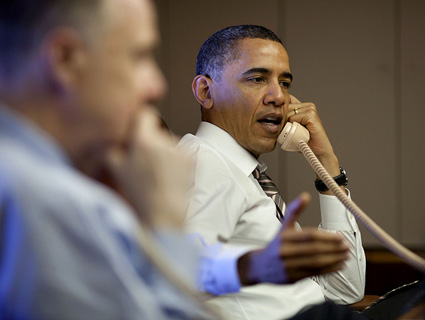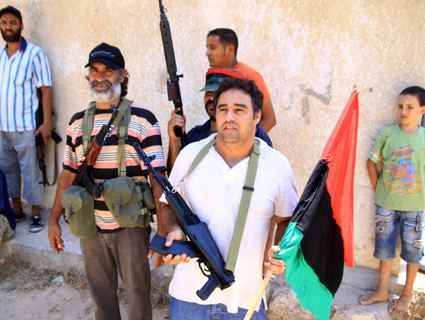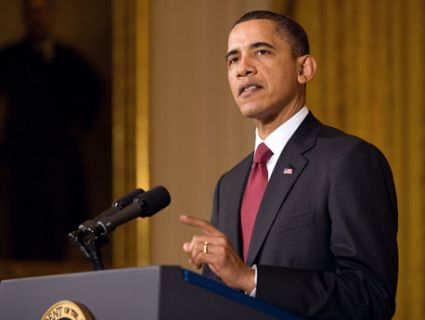
President Barack Obama leads a briefing on the current situation in Libya with National Security Advisor Tom Donilon, foreground, and Chief of Staff Bill Daley during a secure conference call aboard Air Force One.White House/<a href="http://www.flickr.com/photos/whitehouse/5547542093/">Pete Souza</a>.
There’s been much gnawing within the commentariat concerning the Obama Doctrine. That is, if there is one. In his speech on Libya Monday night, the president rendered a rather clear explication: the United States will do what it can, when it can, where it can—to serve humanitarian and security interests—after carefully weighing the costs and benefits of the particular action under consideration, after consulting with allies and regional partners in order to form an effective coalition, and after assessing the needs and desires of the folks on the ground. These guidelines are not too difficult to fathom. Obama was detailing a doctrine of limited and realistic intervention, with several sliding scales. Bottom line: no more Iraq invasions.
Throughout his speech at the National Defense University (NDU), Obama implicitly and explicitly compared the Libyan military action to the Iraq war, noting that the latter was neither justifiable or cost-effective. In many ways, his doctrine is an anti-doctrine, counter-posed to what his predecessor did. Repeatedly, Obama made this point. Here are the notable instances of when he insisted he was not proceeding in a Bushian manner:
- “Confronted by this brutal repression and a looming humanitarian crisis, I ordered warships into the Mediterranean. European allies declared their willingness to commit resources to stop the killing. The Libyan opposition and the Arab League appealed to the world to save lives in Libya. And so at my direction, America led an effort with our allies at the United Nations Security Council to pass a historic resolution that authorized a no-fly zone to stop the regime’s attacks from the air, and further authorized all necessary measures to protect the Libyan people.” WIth this passage, Obama was making it plain: he was responding to a potential slaughter, not intervening based on the suspicion or presumption of a threat; he was doing so at the request of regional powers and the citizens at risk; and he had engaged in this limited intervention after succeeding in winning a UN resolution supporting the action.”America’s role would be limited.” This was not the watchword of the Iraq invasion.
- “[T]he United States has worked with our international partners to mobilize a broad coalition, secure an international mandate to protect civilians, stop an advancing army, prevent a massacre, and establish a no-fly zone with our allies and partners.” In other words, the Obama administration did what the Bush crew did not: it assembled a true coalition that could operate under an international consensus.
- “[W]hile our military mission is narrowly focused on saving lives, we continue to pursue the broader goal of a Libya that belongs not to a dictator, but to its people.” Obama was explaining that he expected military action to yield limited results, not the big prize: the end of the Qaddafi regime. That would have to be achieved by other means employed by the United States and its international partners.
- “We had a unique ability to stop that violence [a potential Qaddafi attack on Benghazi]: an international mandate for action, a broad coalition prepared to join us, the support of Arab countries, and a plea for help from the Libyan people themselves.” No conditions like these preceded Bush’s decision to invade Iraq.
- “But broadening our military mission to include regime change would be a mistake. The task that I assigned our forces—to protect the Libyan people from immediate danger, and to establish a no-fly zone—carries with it a UN mandate and international support. It’s also what the Libyan opposition asked us to do. If we tried to overthrow Qaddafi by force, our coalition would splinter. We would likely have to put US troops on the ground to accomplish that mission, or risk killing many civilians from the air.” The name of the military game is not regime change. Should that happen, Obama won’t complain. But he was asserting there’s nothing wrong with pursuing a limited military goal—even while simultaneously seeking a broader aim (the fall of Qaddafi) with other methods. Obama proclaimed that regime change via military action in Iraq had not been a good deal: “regime change there took eight years, thousands of American and Iraqi lives, and nearly a trillion dollars. That is not something we can afford to repeat in Libya.”
- “[T]he burden of action should not be America’s alone. As we have in Libya, our task is instead to mobilize the international community for collective action. Because contrary to the claims of some, American leadership is not simply a matter of going it alone and bearing all of the burden ourselves. Real leadership creates the conditions and coalitions for others to step up as well; to work with allies and partners.” Real leadership—get it? True leaders don’t launch blunderbuss invasions on their own; they shape the world through collective action.
- “The United States will not be able to dictate the pace and scope of this change. Only the people of the region can do that. But we can make a difference.” This is not about the United States; it’s about other nations.
The Bush administration and its neocons had a made-in-the-USA world view: the United States could and should act largely on its own and use military force to implement (or impose) its vision for the Middle East. Obama’s take is more modest. The United States must use its power judiciously and in concert with other players, reserving the right to go cowboy if absolutely necessary to protect the United States. On the way to different wars, Bush and Obama each decried a dictator and spoke as champions of human rights. They each generated complaints. (Bush refused to consider other options; Obama was light on congressional consultation). But at the NDU, Obama made sure to differentiate himself from Bush. In doing so, he was redefining the parameters of US interventionism—at least until the next one—and asserting that the United States, even as it engages in military action in the Arab world (while still fighting in Afghanistan), remains in a post-Bush era.










